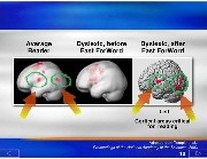Dyslexic Learners Dramatically Improve Reading Skills with Fast ForWord

Thursday 01 Dec 2011 00:00 AM In this study, Nadine Gaab and her colleagues investigated which regions of children's brains were active in response to rapid auditory stimuli, determining whether the activation patterns were similar in children with dyslexia and children with typically developing reading skills, whether these differences could be remediated, and whether the remediation would results in changes in language and reading scores.
Pre-tests showed that the students with dyslexia had reading skills that were significantly below the reading scores of their typically developing peers.
After using the Fast ForWord product, students' reading and language skills were re-evaluated. The students had made statistically-signiticant improvements in:
These results show that the neural circuitry of children with developmental dyslexia is plastic -- it can be changed.
Pre-tests showed that the students with dyslexia had reading skills that were significantly below the reading scores of their typically developing peers.
After using the Fast ForWord product, students' reading and language skills were re-evaluated. The students had made statistically-signiticant improvements in:
- sight-word reading and
- passage comprehension as well as their
- total language skills and
- phonological awareness.
These results show that the neural circuitry of children with developmental dyslexia is plastic -- it can be changed.
